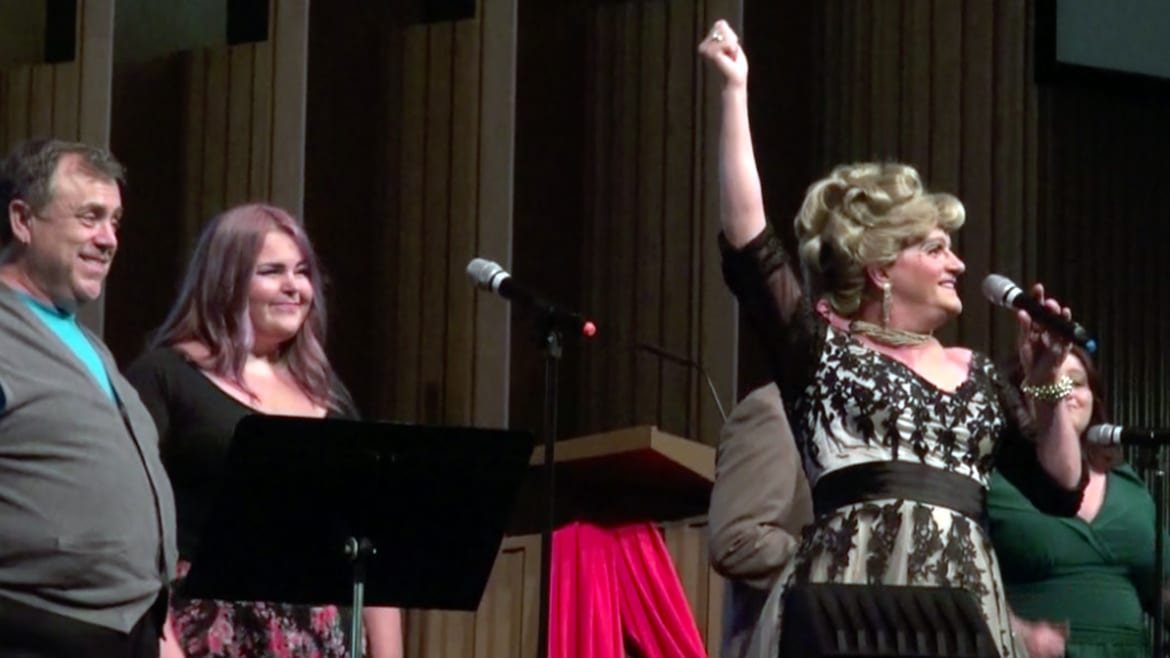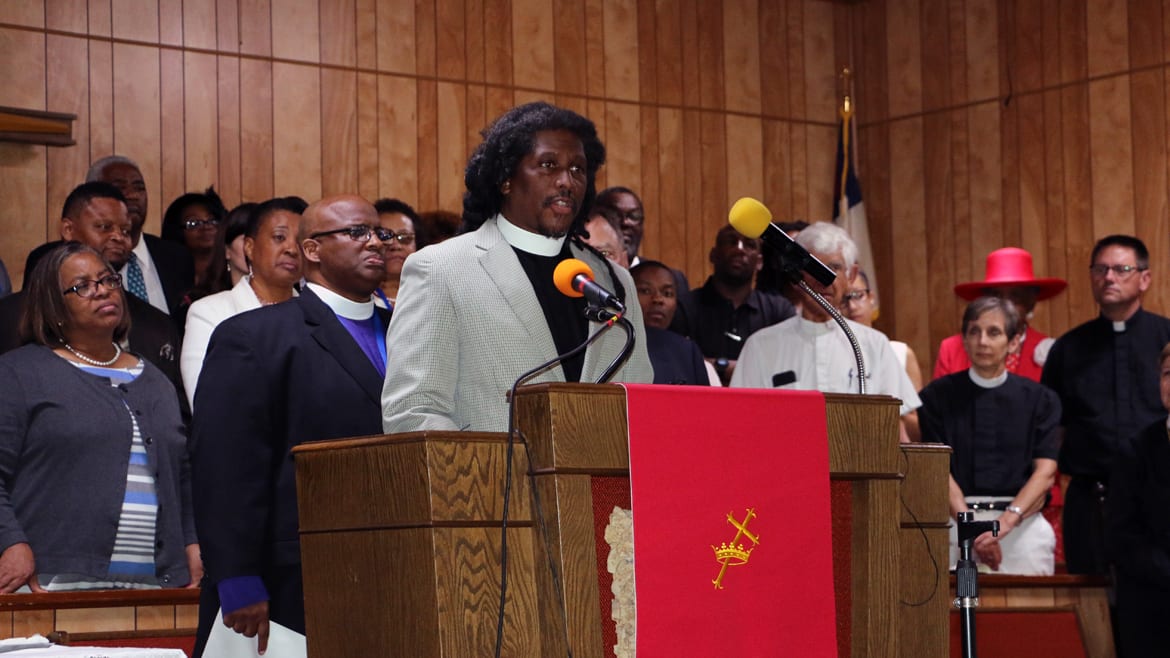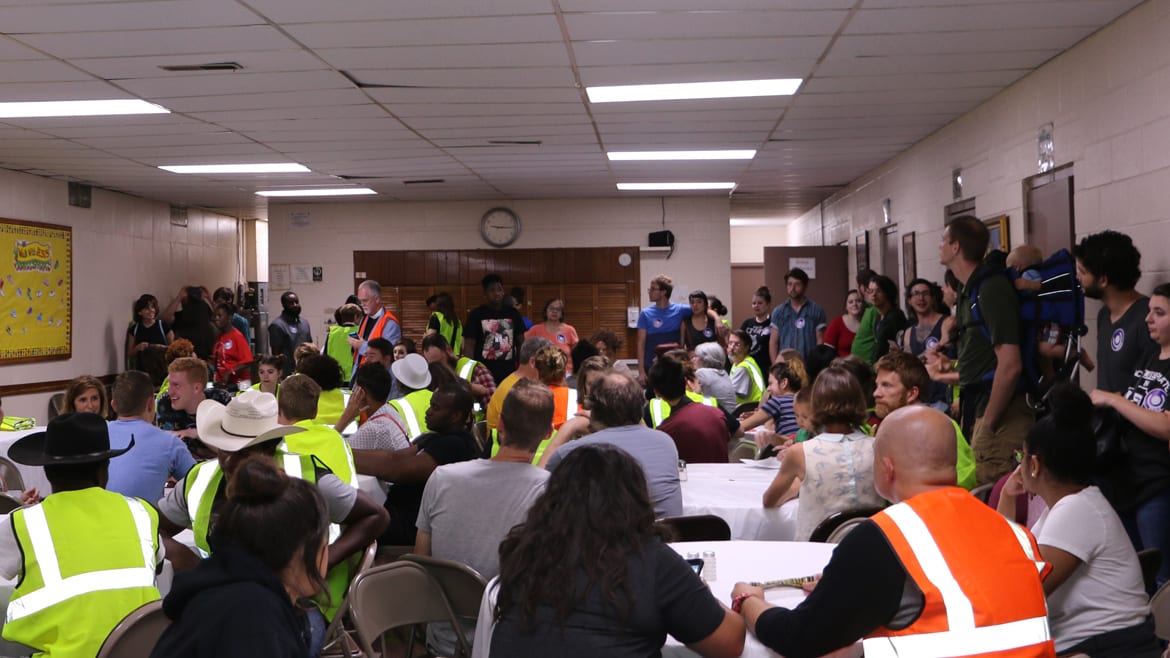Peace Outside and Inside As the Mourning Continues After National Shootings, Local Groups Gather for 'Peace Walk' and Fundraiser
 Dudley Hogue, (right, foreground) and other Kansas City actors and musicians sing 'The Best Of Times Is Now,' at a fundraising concert for the Orlando shooting victims and families. For more on the fundraiser, see sidebar below. (Photo: Daniel Boothe | Flatland)
Dudley Hogue, (right, foreground) and other Kansas City actors and musicians sing 'The Best Of Times Is Now,' at a fundraising concert for the Orlando shooting victims and families. For more on the fundraiser, see sidebar below. (Photo: Daniel Boothe | Flatland)
Published July 13th, 2016 at 4:33 PM
For the Rev. Ken McKoy, following the teachings of Jesus does not mean simply preaching from the pulpit.
“There’s very little record of Christ spending his time in the synagogue,” said McKoy, a St. Louis pastor who walks the dangerous streets of his city three nights a week armed only with his faith and the urge to help the youth on the street.
“In my imagination, we’ll start a movement for other congregations, other religions,” he said. “We’re challenging contemporary church culture to stretch what they’ve been doing.”
And that’s why McKoy was in Kansas City on Friday night, where he led a “peace walk” on the East Side. The event came a day after the slaying of law enforcement personnel in Dallas following the racially charged police shootings in Louisiana and Minnesota.
The mourning was sadly reminiscent of a vigil held only last month in downtown Kansas City, where clergy and supporters gathered to mourn the massacre at a gay nightclub in Orlando, Florida.
One of the most enduring images of the Orlando vigil was Kansas City Mayor Sly James expressing his frustration, yet again, at the senseless violence here and around the country.
But there were no megaphone speeches at the peace walk, and that’s why McKoy and his local supporters think they have hit upon a strategy that will prove more effective than the protests, demonstrations and social media prayers that follow each incident that horrifies the nation — only to be knocked from the public consciousness by yet another unconscionable act.
“I think the walking is something different from thoughts and prayers,” McKoy said. “Actually sacrificing our bodies is what Christ calls us to do; I think that’s different. What’s been happening is the thoughts and prayers. The engagement hasn’t been happening; we’re doing that, out there building relationships.”
McKoy would like to think that his efforts have helped lead to a slight dip in homicides in the area he walks in St. Louis, even as the homicide rate increased elsewhere in the city. Last year, Kansas City saw the most homicides since 2011.
Organizers estimated that Friday’s event in Kansas City drew roughly 1,000 participants. It began around 9 p.m. as a crowd spilled out of the packed basement of the Metropolitan AME Zion Church on 28th Street and Prospect Avenue to walk almost 2 miles through the streets plagued by gun violence.
Wearing reflective vests, the walkers ignored the jeers of passersby and a break-off Black Lives Matter protest. Along with McKoy, leaders included local and regional clergy from the African Methodist Episcopal Zion Church, many of whom were in town for the African Methodist Episcopal Zion Missouri Conference.
Communities Creating Opportunity and Aim4Peace were the primary groups involved in organizing the walk with AME Zion Church.
CCO is a faith-based organization focused on increasing opportunity for marginalized groups. Aim4Peace is a Kansas City Health Department initiative that works to reduce gun violence and homicides in Kansas City.
Pastor Kelsey Hopson of St. Matthew AME Zion Church on Linwood Boulevard in Kansas City emphasized the need to be mindful of appropriate and inappropriate responses to events like those of last week. Even though God had “righteous indignation,” Hopson said we must be responsible in our actions.
“We cannot become complacent and accept such incidents as normative,” he said. “We need to continue to stand up for what’s right and stand and speak against violence that happens against black and brown bodies. In wake of recent events, killing is never justified. We condemn violence against black bodies, but also violence against those who have been charged to serve and protect.”
Walkers made sure to thank the police officers who blocked traffic along the route.
Antonio Reese and Dawn Araujo-Hawkins, two black Kansas Citians, participated in the walk.
Reese said it seemed as if young black men have two strikes against them, facing not only violence amongst themselves but also incidents of abuse from police.
“I came out here to show that we’re tired of it,” he said. We want a change.”
Araujo-Hawkins said the walk helped her through feelings of helplessness and despair for a couple of reasons.
“For black people, the church has been a place of solace and strength, so I think in that aspect, having black clergy here is continuing a tradition of strong black theology,” she said. “I think of having diverse clergy here, it speaks to this idea of people asking, ‘Where are white pastors when something like this happens?’ But they’re out here, and they’re doing something.”
— Kelly Cordingley is an intern for KCPT and a recent University of Kansas graduate. Follow her on Twitter @KellyCordingley. To reach Cordingley, email kcordingley@kcpt.org.





